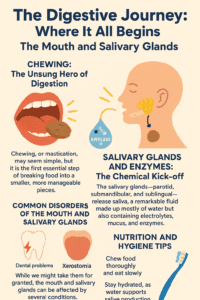
The digestive system is one of the body’s most fascinating networks, working tirelessly to transform what we eat into the nutrients our cells need for energy, growth, and repair. While digestion might seem like it starts in the stomach, the process actually begins the moment food touches our lips. The mouth and salivary glands act as the entry gate to this incredible journey, setting the stage for everything that follows.
Chewing: The Unsung Hero of Digestion
Chewing, or mastication, may seem simple, but it is the first essential step of breaking food into smaller, more manageable pieces. This process doesn’t just make swallowing easier—it increases the surface area of food, allowing enzymes to work more efficiently. According to a study published in the Journal of Oral Rehabilitation (Pedersen et al., 2019), proper chewing is strongly linked to better digestion and even improved satiety, meaning it helps us feel full faster and prevents overeating.
Salivary Glands and Enzymes: The Chemical Kick-off
The salivary glands—parotid, submandibular, and sublingual—release saliva, a remarkable fluid made up mostly of water but also containing electrolytes, mucus, and enzymes. The most important of these enzymes is amylase, which starts breaking down complex carbohydrates like bread, pasta, or rice into simpler sugars even before the food leaves your mouth. This early breakdown eases the burden on the stomach and small intestine later in the process.
Saliva also has protective roles: it lubricates food, prevents tooth decay by neutralizing acids, and contains antimicrobial compounds that fight off bacteria. Research in Nature Reviews Gastroenterology & Hepatology (Humphrey & Williamson, 2001) highlights saliva’s role as the body’s first line of defense against oral and digestive tract infections.
Common Disorders of the Mouth and Salivary Glands
While we might take them for granted, the mouth and salivary glands can be affected by several conditions:
Dental problems such as cavities or gum disease can impair chewing and affect digestion downstream.
Xerostomia (dry mouth), often caused by medication or autoimmune conditions like Sjögren’s syndrome, reduces saliva production and makes swallowing difficult.
Salivary gland infections or stones may cause painful swelling and interfere with enzyme release.
Nutrition and Hygiene Tips
Maintaining oral and digestive health begins with daily choices:
Chew food thoroughly and eat slowly—this not only aids digestion but also enhances mindfulness while eating.
Stay hydrated, as water supports saliva production.
Limit sugary foods and processed snacks, which can damage teeth and alter the natural microbial balance of the mouth.
Incorporate fibrous fruits and vegetables, which stimulate chewing and saliva flow. Apples, carrots, and celery are nature’s toothbrushes.
Regular dental check-ups are more than cosmetic—they’re a frontline defense for your digestive system.
The Bigger Picture
The mouth and salivary glands may represent only the beginning of the digestive system, but they play a disproportionately important role. Without efficient chewing and the enzymatic power of saliva, the rest of the digestive tract would be under strain. The simple act of chewing properly and caring for oral health is, therefore, a surprisingly powerful investment in your overall well-being.
⚠️ Disclaimer: This article is for informational purposes only and does not replace professional medical advice. For any concerns related to oral or digestive health, please consult a qualified healthcare provider.
![]() GINKGOBIOVITALITE ™ – VIBRATION REMEDY ™ Team
GINKGOBIOVITALITE ™ – VIBRATION REMEDY ™ Team
